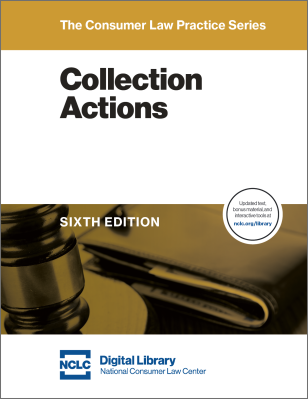Timbs v. Indiana Notable for Its Holding and the Opinion’s Language
The recent 9–0 Supreme Court judgment in Timbs v. Indiana, 2019 WL 691578 (U.S. Feb. 20, 2019) is an essential building block in the growing movement to challenge excessive fines, fees, and costs levied on and then collected from indigent defendants. The core holding is that the Eighth Amendment’s Excessive Fines Clause is an incorporated protection applicable to the states. There thus is a federal cause of action in federal court for excessive fines imposed not just by the federal government, but by state and local governments.
Also notable in the opinion is language critiquing current trends by state and local governments using the imposition of criminal and civil fines to fund government operations. Justice Ginsburg’s majority opinion is sure to be quoted in challenges to imposition of excessive fees on those unable to pay them.
The Core Holding in Timbs
The core holding in Timbs is that the Eighth Amendment protection against excessive civil or criminal fines applies to fines levied by the states. This 9–0 holding is not surprising: the Court had long held that the parallel protections in the Eighth Amendment against “excessive bail” and “cruel and unusual punishment” applies to the states.
All 50 state constitutions prohibit excessive fines or require proportionality, so there are already state restrictions on state and local governments. But Timbs holds that the federal Constitution also applies, meaning there is a federal cause of action in federal court for state and local governments imposing excessive fines.
Timbs does not address how to determine when a fine is unconstitutionally excessive. In Timbs, the lower courts had refused the state’s civil forfeiture request to seize a defendant’s $42,000 car because the state’s maximum fine for the relevant drug crime was $10,000, and the seizure would violate the Eighth Amendment protection against excessive fines. The state’s highest court reversed, finding the Eight Amendment’s Excessive Fines Clause did not apply to the states. The Supreme Court overturned that holding, finding that the Eighth Amendment’s Excessive Fines Clause is an “incorporated” protection applicable to the states under the Fourteenth Amendment.
The Court also rejected Indiana’s argument that the Eighth Amendment does not apply to civil asset forfeitures imposed by a state. The Court had previously unanimously held, in Austin v. United States, 509 U.S. 602 (1993), that civil asset forfeitures do fall within the Excessive Fines Clause’s protection when they are at least partially punitive. Because Indiana had failed to assert this argument below, the Court declined to reconsider Austin. (Timbs at 7-8.)
Further, the Court made clear that when considering whether a protection is incorporated by the Fourteenth Amendment, it looks to whether the general protection guaranteed is fundamental or deeply rooted, and not whether each particular application of that right is fundamental or deeply rooted, and thus whether application of the Excessive Fines Clause to civil forfeitures specifically is fundamental is irrelevant.
The judgment was unanimous, but Justice Thomas would have held that the clause was incorporated through the Fourteenth Amendment’s Privileges or Immunities Clause rather than the Due Process Clause, and Justice Gorsuch had a similar concurring note.
Timbs Opinion Flags Risk of State and Local Governments’ Use of Fines to Finance Government Operations
Timbs is notable for language found in Justice Ginsburg’s majority opinion outlining the importance of the protection against excessive fines and against state and local governments’ use of fines to finance government operations. This language is sure to be used in litigation and policy arguments that are being advanced against the increasing use of criminal fines to finance state and local governments, which has devastating impacts on low-income families and distorts the goals of the criminal justice system. See, e.g., Criminal Justice Debt in the South (Dec. 2018). Because people can be jailed or have supervision extended based on nonpayment of fines, excessive fines can criminalize poverty.
Justice Ginsburg wrote that the protection against excessive fines is “fundamental to our scheme of ordered liberty” with “deep roots in our history and tradition,” and is therefore incorporated by the Due Process Clause of the Fourteenth Amendment. Tracing the lineage of the protection back to the Magna Carta (which the Court had previously recognized required that economic sanctions “be proportioned to the wrong” and “not be so large as to deprive [an offender] of his livelihood”), the English Bill of Rights, and colonial era provisions and state constitutions, the Court found the historical case for incorporation “overwhelming.” (Timbs at 4, 7.)
The opinion explained that the protection against excessive fines has long been embraced for good reason, including that “fines are a source of revenue” for government and thus may be used “in a measure out of accord with the penal goals of retribution and deterrence.” (Timbs at 6 (quoting Harmelin v. Michigan, 501 U.S. 957, 979 n.9 (1991).) The opinion then quoted an ACLU amicus brief: “Perhaps because they are politically easier to impose than generally applicable taxes, state and local governments nationwide increasingly depend heavily on fines and fees as a source of general revenue.” (Timbs at 7.)
Other references in the opinion provide further historical context for the racial and economic injustices perpetuated through excessive fines. The opinion notes that after the Civil War, southern states included in their Black Codes new draconian fines for dubious offenses like vagrancy, and used these provisions to force newly freed slaves—unable to afford the fines—to perform involuntary labor. (Timbs at 5–6.)
Still today, communities of color, and especially African-American communities, are disproportionately targeted for enforcement of the types of minor crimes and infractions that generate fines and fees. See, e.g., U.S. Commission on Civil Rights, Targeted Fines and Fees Against Communities of Color 72 (Sept. 2017). Potential application of the Equal Credit Opportunity Act and Title VI of the Civil Rights Act to fines and fees are addressed in NCLC’s Collection Actions §§ 11.7.3 and 11.7.2, respectively.
Ability to Pay and the Excessive Fines Clause
The excessive fines doctrine is currently underdeveloped, but now that the Clause clearly applies to state fines, there is likely to be more litigation regarding how to determine when a fine is excessive. One of the most important questions to be resolved is whether an individual’s financial circumstances are relevant to determining if a fine is excessive. See United States v. Bajakajian, 524 U.S. 321 (1998) (question of whether trial court should consider defendant’s financial status unresolved).
Inquiries into whether a fine is excessive have typically focused only on whether the fine is grossly disproportionate to the severity of the offense. But legal scholars posit that the historical record supports a broader reading of the Excessive Fines Clause that would also protect against fines that are excessive relative to the financial capacity of an individual and the impact the fine would have on that individual, and some courts have considered such individual circumstances. See NCLC’s Collection Actions § 11.7.1.4.
Need for Legal Representation Concerning Excessive Fines
Too often there is little or no legal representation for individuals facing civil or criminal fines, fees, and costs, and just as important, little or no legal representation for those facing enforcement actions for non-payment of those fines, fees, and costs. Criminal justice debt representation too often falls through the cracks between criminal defense attorneys and civil legal service providers. NCLC’s Collection Actions §§ 11.1.1, 11.4.2.
Attorneys can make a difference. Among other things, legal representation can:
- Limit the imposition of excessive and unaffordable criminal justice fines and fees in the first place (Id. § 11.3);
- Facilitate the debtor obtaining a payment plan or modification or remission of the debt itself (Id. § 11.4.6);
- Advocate for the application of federal or state exemption law to protect assets and income (Id. § 11.5);
- Ensure that a debtor is not unconstitutionally incarcerated based on nonpayment if the debtor was unable to afford to pay a fine or fee (Id. § 11.4.4); or
- Seek discharge of certain debts in bankruptcy (Id. § 11.6).
Further, when thinking about protection against excessive fines, advocates should always consider whether a constitutional or statutory right to determining a client’s ability-to-pay exists prior to imposing or enforcing a fine or fee. See NCLC’s Collection Actions §§ 11.2.2, 11.3.4, 11.4.4, 11.7.1.1, 11.7.1.2.


